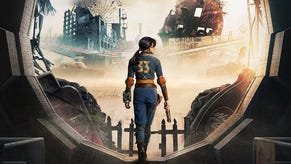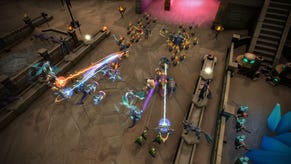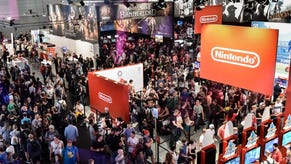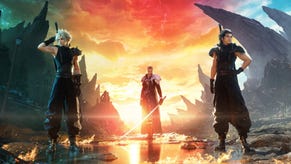Arrowhead aims for niche, hits wider audience
Developers who made Helldivers for themselves nominated alongside AAA giants at this year's DICE Awards
Next month's DICE Awards could be one for the underdogs. From Outstanding Achievement in Game Direction candidate Undertale to Best Game finalist Ori and the Blind Forest, the categories are sprinkled with a number of celebrated games from smaller development teams. Best Action Game is one such category, where Arrowhead Studios' Helldivers is going up against Star Wars: Battlefront, Destiny: The Taken King, Just Cause 3, and Splatoon, games with marketing budgets beyond Helldivers' rosiest revenue projections.
That's assuming Arrowhead even has revenue projections. As CEO Johan Pilestedt told GamesIndustry.biz, the 30-person team is somewhat averse to the common practices of its larger counterparts.
"We don't do that much market research or anything fancy like that," Pilestedt said. "We're still a band of rogue developers who just want to make games we ourselves would like. That might not be the best idea if you're running a large, multinational corporation."
"I became so frustrated with the games industry generally trying to target everybody."
You can see that attitude reflected on the studio's official website, which prominently proclaims an ethos that would be anathema to any AAA dev, "A game for everyone is a game for no one." It was an idea Pilestedt first seized on during development of Arrowhead's original breakthrough hit, Magicka.
"I became so frustrated with the games industry generally trying to target everybody," Pilestedt said. "If a game wasn't considered a large enough commercial success, it wouldn't get made even though you'd have a smaller niche market that would really love the game... Games that you create for everybody are going to be something the mass market can accept, play, and enjoy, but gamers who have a specific interest--really hardcore gamers--won't enjoy them as much because you have to cut so many corners around certain topics or gameplay features to make them accessible to everybody."
As a result, Arrowhead's developers have been making games for themselves. That approach worked especially well for Magicka, which has sold 3.6 million copies and prompted publisher Paradox Interactive to produce a sequel (albeit one in which Arrowhead was not involved). However, it doesn't always come together so smoothly, as Pilestedt said the studio discovered while making The Showdown Effect.
A 2.5D multiplayer action game conceived as a merger of Quake-style competitive play and a liberally applied varnish of 80's action movie references, The Showdown Effect stumbled for a number of reasons. Pilestedt said the team had trouble getting the action to feel right, and a limited scope (there were only four multiplayer levels finished at release) hurt the project.
"Game development is always a bit of a risk. Even if you make a really good game, it depends on how much marketing you have, when it's released, what else is released [at the same time]."
"Game development is always a bit of a risk. Even if you make a really good game, it depends on how much marketing you have, when it's released, what else is released [at the same time]," Pilestadt said, adding, "There are always these external things happening, such as the release of other games or the general mind frame of customers at that point. Releasing a Minecraft-style game now is probably not the best idea since you had Minecraft and a lot of Minecraft copies being released afterwards. Same with zombie games, etc. So there's always this fatigue in the market based on what has been released previously. It's really hard to judge since games on average take between one and three years to develop. It's really hard to judge what the state of the games industry is going to be at the end of the period."
Undeterred, Arrowhead embarked on a bit of expansion. The studio took on two projects at once--a Gauntlet reboot for Warner Bros. and Helldivers for Sony--a move that necessitated bringing on more people and splitting the team in two. And while game development remained unpredictable, this set-up has at least yielded pleasant surprises. In addition to the two DICE nominations (Helldivers is also up for Best Handheld game), Arrowhead was surprised not just at how well Helldivers performed, but where. Originally designed as a PS3 game and scaled up and down to the PS4 and Vita, respectively, Helldivers was originally expected to do best on its native platform.
"We always had the expectation that the game would sell the most on the PS3 and the PS Vita and PS4 would probably be tied [behind that]," Pilestedt said. "But what happened was the majority of the sales, about three-quarters, were on the PS4, and a majority of the remaining was sold on the PS Vita. So it was only a small sub-section of gamers that bought the game on PS3, which was kinda surprising."
Despite these results, Pilestedt was unhappy with the bifurcated development team.
"Am I worried? Every single day. But there are a lot of things you can learn from history and other studios."
"It created a two-team studio mentality," he said. "It got a bit segregated. So we realized after we did Gauntlet and Helldivers that we really needed to bring the teams together again to create this good core team mentality where everybody is helping everybody else, and everybody is friends with everybody else. That's something I value highly in the studio."
Of course, now the team is more than twice as big as when it was making Magicka, and Arrowhead has to work on a larger project that can support that team size. It's still not AAA development, but it is a bit bigger and riskier than Arrowhead has experienced in the past. Even so, Pilestedt isn't worried about losing the qualities that made the studio successful in the first place.
"There's this classic grow-or-die mentality, and to a certain extent we keep on doing that," Pilestedt said. "When we finished Magicka, we felt, 'If we only had a couple more dudes, we could make an even better game.' And for the next project, we had a couple more dudes. And after development, we felt again, 'if we had a couple more dudes...' You realize what you need to make the game a little better every time, and it requires you to have an additional person or two on the team. So in a sense, it is a natural growth. Not only from a company perspective, but more from a perspective of what we can create and what games we can make."
At the same time, Pilestedt remembers the industry of a decade or more ago, when mid-size studios working project-to-project shut down one after the other because they didn't have the cash flow to survive losing a project from a publisher or cancelling a game.
"Am I worried? Every single day," Pilestedt admitted. "But there are a lot of things you can learn from history and other studios."
Arrowhead tries to balance its creative aspirations with proper management, and Pilestedt said the rule of thumb for the company is that it needs to have financial security to stay afloat for at least half a year if things hit the fan.
"I think that is enough time to mitigate any of those catastrophes that can occur. It's just a matter of being more mature in the way you look at the games industry. We look at every project we make as something that couple potentially end up in misery at any given point."








